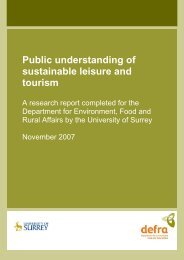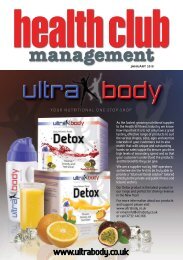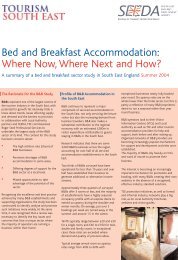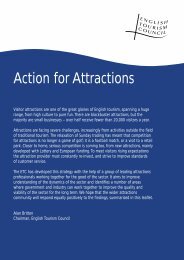Spa Business issue 2 2012 - Leisure Opportunities
Spa Business issue 2 2012 - Leisure Opportunities
Spa Business issue 2 2012 - Leisure Opportunities
Create successful ePaper yourself
Turn your PDF publications into a flip-book with our unique Google optimized e-Paper software.
RESEARCH<br />
THE<br />
FINISHING<br />
TOUCH<br />
HAPPY TALK<br />
The argument that positive wellbeing<br />
could – and should – be used in the<br />
fi ght against bad health and stress<br />
has been highlighted by a UK study*.<br />
Scientists from the University College<br />
of London have found that the happiest<br />
people, who have a more positive outlook,<br />
are 35 per cent less likely to die in the short<br />
term than those who are miserable.<br />
While many existing studies already show<br />
that happy people are healthier, this study is<br />
unique because the participants were accurately<br />
reporting their mood in real time<br />
rather than recollecting them at a later date<br />
which can prove unreliable.<br />
IN THE MOOD<br />
Th e study was based on 3,853 people in total<br />
aged between 52 to 79. Using the ecological<br />
momentary assessment (EMA) method,<br />
they recorded their mood four times in one<br />
day – on waking, 30 minutes aft er waking,<br />
at 7pm and when they went to bed.<br />
Each time, they rated the extent to which<br />
they felt happy, excited, content, worried, anxious<br />
or fearful on a scale of one to four. Th e fi rst<br />
three feelings were combined and described<br />
as positive aff ect (PA) in the results.<br />
The subjects were then divided into<br />
three groups based on their PA rankings –<br />
high, medium and low. Aft er fi ve years, the<br />
researchers followed up with the members<br />
of each group to record who had died dur-<br />
98 Read <strong>Spa</strong> <strong>Business</strong> online spabusiness.com / digital<br />
Being happy is the key<br />
to older adults living a<br />
longer life according to<br />
a British study based<br />
on 3,800 people<br />
ing that time. Factors such as age, gender,<br />
depression, health and lifestyle – which<br />
might have infl uenced the results – were<br />
taken into account.<br />
DON’T WORRY, BE HAPPY<br />
Th e group with the highest PA scores had<br />
a gradual increase in lifespan it was found.<br />
Only 3.6 per cent of the high-PA group had<br />
died during the fi ve years. In contrast, 4.6<br />
per cent in the middle bracket and 7.3 per<br />
cent in the lower third had died.<br />
In short, the happiest people were 35 per<br />
cent less likely to die. Yet more negative<br />
emotions did not reverse the trend and had<br />
little infl uence on survival.<br />
“We were surprised that measures<br />
obtained over one single day might predict<br />
so strongly,” said lead author Andrew Steptoe<br />
in an article on the health-based website<br />
healthymagination.com. Other fi ndings the<br />
website highlighted were:<br />
KATIE BARNES » MANAGING EDITOR » SPA BUSINESS<br />
The happiest<br />
people<br />
outlived those<br />
who were<br />
miserable<br />
■ Th e happiest people were<br />
slightly younger and more likely<br />
to be male and married<br />
■ Positive emotions overall were lowest<br />
at 7am and highest at 7pm<br />
■ Ethnicity, paid employment, education<br />
and presence of serious disease<br />
made no signifi cant diff erence to PA<br />
■ Smoking was less common<br />
and physical activity higher<br />
among those with higher PAs<br />
■ Happier people had higher opinions<br />
of their own health<br />
However, Steptoe was keen to point out<br />
that the results don’t prove that happiness<br />
causes people to live longer. He told UK<br />
newspaper Th e Telegraph: “Th e happiness<br />
could be a marker of some other aspect of<br />
people’s lives which is particularly important<br />
for health. For example, happiness is quite<br />
strongly linked to good social relationships –<br />
maybe it’s things like that which are account<br />
for the link between happiness and health.”<br />
He also suspects that biological processes<br />
could be at work: other studies have shown<br />
that positive moods reduce stress-related hormones<br />
and boost the immune system. ●<br />
*Steptoe A and Wardle J. Positive aff ect measured<br />
using ecological momentary assessment<br />
and survival in older men and women. PNAS.<br />
Vol 108, no 45, November 2011<br />
SPA BUSINESS 2 <strong>2012</strong> © Cybertrek <strong>2012</strong><br />
YURI ARCURS / SHUTTERSTOCK.COM

















